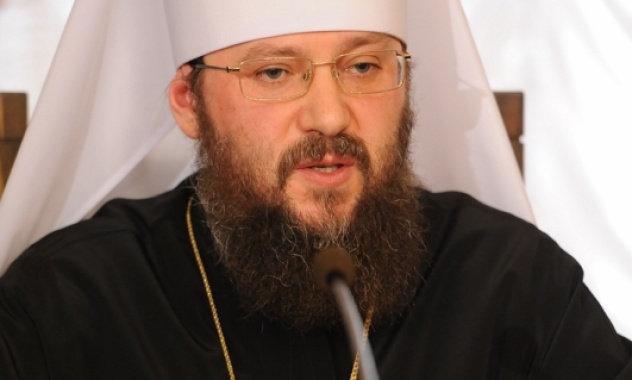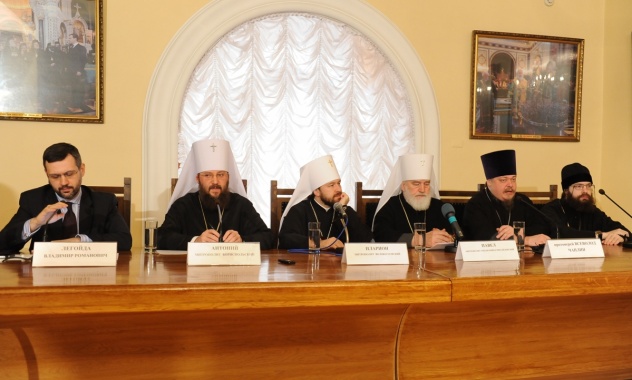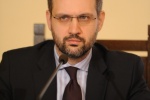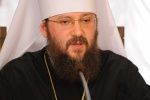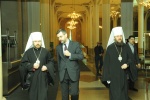Press conference on results of Bishops’ Council of Russian Orthodox Church took place
Press conference on the results of the Holy Bishops’ Council of the Russian Orthodox Church held in Moscow from 2nd to 5th February 2013 took lace on February 6. Taking part in the meting with the journalists in press centre of the Cathedral of Christ the Saviour were Metropolitan Hilarion of Volokolamsk, chairman of the Moscow Patriarchate’s Department for External Church Relations; Metropolitan Pavel of Ryazan and Mikhailov, head of the Council’s Drafting Committee; Metropolitan Antoniy of Borispol, chancellor of the Ukrainian Orthodox Church of the Kiev diocese and first vicar of the Kiev Metropolia; Archimandrite Savva (Tutunov), deputy chancellor of the Moscow Patriarchate; archpriest Vsevolod Chaplin, chairman of the Synodal Department for Church-Society Relations; and Mr. Vladimir Legoida, chairman of the Synodal Information Department, who opened press conference and introduced its participants to the journalists.
Metropolitan Hilarion addressed representatives of the mass media, saying in particular, “This Council was the most representative in the history of the Russian Orthodox Church. Neither in the pre-revolutionary epoch, nor in modern times had so many hierarchs gathered for Divine services at the Cathedral of Christ the Saviour or in the Hall of Church Council to discuss topical problems of church life.
“According to the Statute, the Bishops’ Council must be convened no less than once in four years, but actually it is convened once in two years being thoroughly prepared. Therefore, His Holiness Patriarch Kirill initiated the Inter-Council Presence following the example of the Pre-Council Presence that worked during preparation for the Local Council of 1917-18. There are several commissions in the Inter-Council Presence. They discuss various topic of church life, including the controversial ones. This body prepares agenda for the Bishops’ Council which takes decisions on the discussed matters.
“On the first day of the Council’s work, His Holiness Patriarch Kirill presented a penetrating report on the major problems of church life at home, her external relations, and relations with society, which could be different as our Church is multinational and fulfils her ministry in different countries.
“I would like to note the unanimity that prevails at the Bishops’ Council. This fraternal and constructive atmosphere was greatly conducive to its success.
Many archpastors participated in such a high gathering for the first time, as they have been consecrated bishops only recently. The process initiated by the Patriarch has led to the so called “sub-division” of diocese. For instance, in the territory in which one diocese existed earlier, – two, three or four dioceses were established and united into a metropolitan area because the Church is giving a new impetus to her missionary ministry and her relations with society.
“This process concerns mostly the so called ‘province’, as the revival of the Church can be seen in large cities and regional centres with magnificent cathedral, theological schools and active church life. The situation is different in little towns and villages. The enemies of the Church and sectarians use it to their advantage. The establishment of new dioceses and the diocesan centres is aimed at bringing bishops closer to the people. There were dioceses with 500-600 parishes located in great distance of one another, while now, after the Council has taken certain decisions, all bishops will know all priests personally, visit parishes and exert real influence on their life.
“A visual symbol of these processes was the presence of many metropolitans in white cowls at the Council, but the most important thing and result of the Council was the unanimity manifested in discussions.
“I believe that all bishops have had good impression and would heed to recommendations and implement concrete decisions of the Council.
“I am confident that these decisions will give a fresh impetus to successful development of our church life.”
Other participants in the press conference told the press about the documents adopted by the Council, and the journalists asked many questions.
While answering them, Metropolitan Hilarion underscored the importance of the documents on the Church’s position on the current problems of ecology, on the reform of family legislation and on the problem of juvenile justice.
Metropolitan Hilarion mentioned a forthcoming visit of His Holiness Patriarch Kirill to Estonia and expressed his hope for the solution of the problem relating to the Moscow Patriarchate’s property in this country, adding that the main goal is the Patriarch’s visit to his flock.
As to theological education in secular higher educational institutions, Metropolitan Hilarion said that this matter had been considered by the Council and reflected in its decisions.
He continued, saying, “There are certain problems, for instance, a prejudice of some scholars against an idea of teaching theology in secular institutes. They ask, ‘We live in a secular society, so why theology?’ We have given answers to this question many times. It is enough to look at the situation in Western Europe and the USA, where the Church is separated from the state, while theology is a recognized specialty and theological departments exist at secular universities. There are many problems related to the reform of education system in the Russian Federation, and a working group on theology in secular universities recently set up by the Holy Synod will do concrete work for their solution.”
Also covered at the press conference was the perpetuation of the names of the new martyrs and confessors of Russia. The journalists were told about concrete steps the Russian Orthodox Church will make for implementing major provision of the documents adopted by the Bishops’ Council.
Other events
-
06.02.2013 19:44Press conference on results of Bishops’ Council of Russian Orthodox Church took place
-
05.02.2013 23:35Bishops’ Council of the Russian Orthodox Church took place on 2-5 February 2013
-
05.02.2013 23:31(Russian) Архиерейский Собор Русской Православной Церкви завершил свою работу
-
05.02.2013 14:10(Russian) Начался четвертый день работы Архиерейского Собора Русской Православной Церкви
-
04.02.2013 21:30(Russian) Завершился третий день работы Архиерейского Cобора Русской Православной Церкви
-
04.02.2013 12:44Bishops’ Council of Russian Orthodox Church continues its work
-
03.02.2013 21:31Bishops’ Council of Russian Orthodox Church completes its second day’s sessions
-
03.02.2013 15:19(Russian) Начался второй день работы Освященного Архиерейского Собора
-
03.02.2013 14:28(Russian) В неделю 35-ю по Пятидесятнице Предстоятель Русской Церкви совершил Литургию в Храме Христа Спасителя
-
03.02.2013 14:06(Russian) Святейший Патриарх: В межсоборный период велась активная работа по претворению в жизнь решений Архиерейского Собора 2011 года
-
03.02.2013 13:59(Russian) Святейший Патриарх Кирилл: Цель межрелигиозного диалога — совместное противостояние безнравственности, агрессивному безбожию и межнациональной вражде
-
03.02.2013 13:51(Russian) Святейший Патриарх Кирилл: Нравственные ценности являются ключом к созиданию межцивилизационного согласия и развитию международного сотрудничества
-
03.02.2013 13:42(Russian) Святейший Патриарх Кирилл: Церковь стремится найти союзников в деле сохранения христианского наследия и защиты традиционных христианских ценностей
-
03.02.2013 13:25(Russian) Святейший Патриарх Кирилл сообщил о развитии межправославных отношений в межсоборный период
-
03.02.2013 12:37(Russian) Святейший Патриарх Кирилл: Необходимо усиление катехизической работы среди казачества
-
03.02.2013 00:38(Russian) Освященный Архиерейский Собор Русской Православной Церкви завершил первый день работы
-
03.02.2013 00:35(Russian) Членам Архиерейского Собора представлен доклад Блаженнейшего митрополита Киевского и всея Украины Владимира
-
03.02.2013 00:20(Russian) Святейший Патриарх Кирилл рассказал о церковно-государственных отношениях в странах Балтии
-
03.02.2013 00:00(Russian) Митрополичий округ в Казахстане сотрудничает с государством и обществом в деле противодействия псевдорелигиозному экстремизму и терроризму
-
02.02.2013 23:45(Russian) Принятый в Молдове закон о культах делает возможной государственную регистрацию деструктивных культов
-
02.02.2013 23:43(Russian) Святейший Патриарх Кирилл: Православная Церковь играет определяющую роль в развитии духовных, государственных и культурных традиций белорусского народа
-
02.02.2013 23:41(Russian) Участников Архиерейского Собора проинформировали об актуальных темах диалога Украинской Православной Церкви с государственной властью Украины
-
02.02.2013 22:55(Russian) Участники Архиерейского Собора ознакомились с изменениями в российском законодательстве, имеющими значение для развития церковного служения
-
02.02.2013 22:46(Russian) Святейший Патриарх Кирилл: Апробация курса «Основы религиозных культур и светской этики» не привела к росту конфликтных настроений в школе
-
02.02.2013 22:40(Russian) Святейший Патриарх Кирилл: Церковь нельзя отделить от общества, потому что большинство населения стран, входящих в каноническую территорию Московского Патриархата, исповедует Православие
-
02.02.2013 22:37(Russian) Святейший Патриарх Кирилл: Православный журналист должен оставаться прежде всего церковным человеком
-
02.02.2013 22:29(Russian) Миссия в виртуальном пространстве не может подменять собой приходскую работу, но должна ее дополнять, подчеркнул Предстоятель Русской Церкви
-
02.02.2013 22:26(Russian) Предстоятель Русской Церкви: Формирование единого информационного поля — общецерковная задача, выполнить которую можно только общими усилиями
-
02.02.2013 19:53(Russian) Святейший Патриарх Кирилл считает необходимым обеспечить получение православной литературы епархиями Дальнего Востока, Центральной Азии и дальнего зарубежья
-
02.02.2013 19:37(Russian) Будет издано пособие для епархий, монастырей и храмов по использованию объектов культурного наследия церковного назначения
-
02.02.2013 19:32(Russian) Предстоятель Русской Церкви: Культурные центры при соборах и храмах призваны прививать уважительное отношение к культуре и традициям своего народа
-
02.02.2013 19:30(Russian) Более девятисот священников окормляют заключенных, находящихся в исправительных учреждениях России
-
02.02.2013 19:28(Russian) Проведена паспортизация церковных детских приютов
-
02.02.2013 19:22(Russian) Епархиям рекомендовано создавать межприходские и общеепархиальные социальные проекты
-
02.02.2013 19:19(Russian) Церковная благотворительность должна быть предметом неизменной заботы всех священнослужителей: от приходского диакона до Патриарха, убежден Предстоятель Русской Церкви
-
02.02.2013 19:15(Russian) Святейший Патриарх Кирилл: За созданием молодежной организации должна стоять пастырская задача — научение молодого поколения жизни по евангельским заповедям
-
02.02.2013 19:13(Russian) Число старообрядных приходов Русской Православной Церкви постепенно увеличивается
-
02.02.2013 19:04(Russian) На Архиерейском Соборе рассмотрели итоги миссионерской деятельности за межсоборный период
-
02.02.2013 19:02(Russian) Освященный Архиерейский Собор обсудит вопрос расхождения празднования Собора новомучеников и исповедников Российских в разных традициях Русской Церкви
-
02.02.2013 18:58(Russian) Предстоятель Русской Церкви: Нужно сохранять и развивать все лучшее в нашей многовековой, многообразной церковно-певческой традиции
-
02.02.2013 18:57(Russian) Святейший Патриарх Кирилл: Гостеприимство по отношению к паломникам должно быть неотъемлемой чертой деятельности современных монастырей
-
02.02.2013 17:06(Russian) Активное обсуждение проекта Положения о монастырях и монашествующих — это попытка отыскать пути возрождения традиций древнерусской монашеской жизни, считает Предстоятель Русской Церкви
-
02.02.2013 16:54(Russian) Святейший Патриарх Кирилл: Развитие богословской науки сегодня невозможно без следования лучшим мировым стандартам
-
02.02.2013 16:51(Russian) Участники Архиерейского Собора ознакомились с комплексом проектов по развитию религиозного образования в Церкви
-
02.02.2013 16:47(Russian) Святейший Патриарх Кирилл призвал создавать в епархиях советы из представителей местных духовных школ и светских теологических кафедр
-
02.02.2013 16:35(Russian) Органы высшего церковного управления разрабатывают программы подготовки профильных сотрудников для епархий
-
02.02.2013 16:32(Russian) Предстоятель Русской Церкви: Методические рекомендации в различных сферах церковного служения носят рамочный характер и должны применяться с учетом имеющихся возможностей
-
02.02.2013 16:30(Russian) Святейший Патриарх Кирилл: Мы не можем позволить себе множить не вполне подготовленное к служению духовенство
-
02.02.2013 15:58(Russian) В Русской Православной Церкви несут служение 290 архипастырей
-
02.02.2013 15:56(Russian) Московский Патриархат формирует реестр церковного имущества
-
02.02.2013 15:46(Russian) Участники Архиерейского Собора ознакомились с развитием приходской жизни в странах дальнего зарубежья
-
02.02.2013 15:01(Russian) Предстоятель Русской Церкви: Расположение храмов должно быть таково, чтобы длинная дорога к ним не становилась препятствием на пути к Богу
-
02.02.2013 14:42(Russian) Святейший Патриарх Кирилл: Приход — это не храм, а православный народ, проживающий на определенной территории
-
02.02.2013 14:38(Russian) Святейший Патриарх Кирилл: Все епархии, входящие в митрополию, несут общую ответственность за деятельность расположенных на ее территории духовных школ
-
02.02.2013 14:37(Russian) Предстоятель Русской Церкви: Митрополии — древняя и традиционная форма церковного устройства
-
02.02.2013 13:56(Russian) Святейший Патриарх Кирилл напомнил, что епископ — не просто администратор, но пастырь, готовый положить душу свою за каждого клирика и мирянина епархии
-
02.02.2013 13:53(Russian) В Русской Церкви насчитывается почти 34 тысячи храмов, где хотя бы раз в месяц совершается Божественная литургия
-
02.02.2013 13:31(Russian) Святейший Патриарх Кирилл: Главные задачи, которые стоят сегодня перед Церковью, были определены Поместным Собором 2009 года
-
02.02.2013 13:16(Russian) Празднование 1025-летия Крещения Руси приобретет всецерковный и широкий общественный характер на всем пространстве исторической Руси
-
02.02.2013 13:11(Russian) Святейший Патриарх Кирилл: Нападки на Церковь не поколебали церковного единства
-
02.02.2013 13:08(Russian) Святейший Патриарх призвал чад Русской Православной Церкви неотступно свидетельствовать о правде Божией и евангельских ценностях
-
02.02.2013 12:45(Russian) Святейший Патриарх Кирилл: Церковь всегда будет давать общественным процессам нравственную оценку и призывать участников любых противостояний к взаимоуважению и мирному диалогу
-
02.02.2013 11:55Bishops’ Council of Russian Orthodox Church opens in Moscow
-
31.01.2013 15:17(Russian) 2-5 февраля 2013 года в Москве пройдет Архиерейский Собор Русской Православной Церкви











